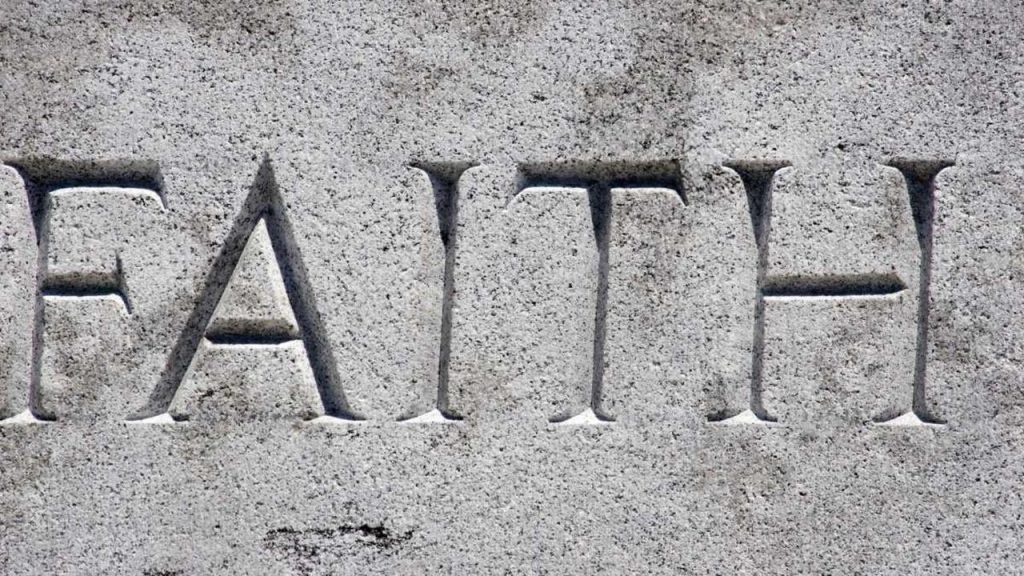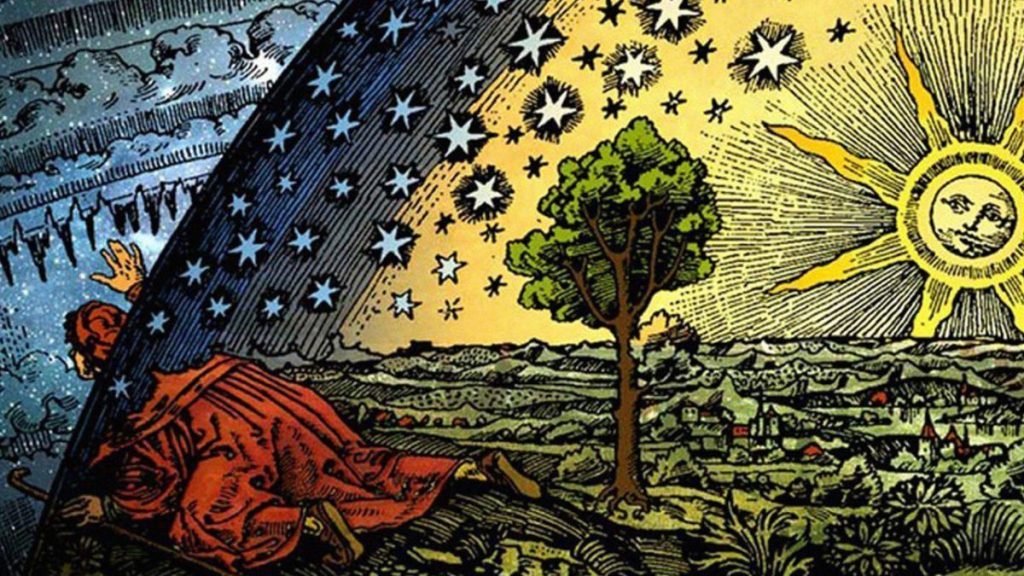It’s a hoot to hear Christian intellectuals rail against “the materialist defaults in secular culture,” claiming that they are “like a spell that’s been cast over modern minds, and the fastest way to become religious is to break it.”
In truth, the wellspring of Western individualism, materialism, secularism and consumerism is the Judeo-Christian belief system and tradition. It has also been the single greatest source of man’s rapaciousness of the earth.
Why have the secular, probably atheistic editors of the New York Times featured a 2700 word essay by their conservative Catholic doyen, shortly after giving space and oxygen to s piece of tripe entitled, “This Is Why America Needs Catholicism”? Their desire to restore the status quo ante has begun to appear desperate.
No thinking person relates to organized religion on a philosophical level anymore. Some relate to it on a communal level, but that has little more meaning than belonging to any group of people gathering once a week around an activity they have in common.

“A Guide To Finding Faith” does not, as it half-heartedly pretends to, present a case for being open to an infinite dimension of sacredness beyond thought and the mind of man. Rather, it is an argument for stepping back into the tar pit of organized religion and its traditions.
It’s deeply disingenuous for a conservative Catholic to pretend to care about questions of religious experience, when what he really cares about is preserving his own narrow worldview, decaying tradition, and irrelevant institution.
Many people, we are told, “find certain God-haunted writers interesting or inspiring… but they struggle to make the leap of faith, to reach a state where the supernatural parts become believable and the grace to accept the impossible is bestowed.”
“God-haunted writers.” What a strange and demeaning term for people who actually grapple with questions of mystical union and true communion, rather than pontificate from comfortable corners of hidebound belief.
This and other haughty statements epitomize, in tone and content, why belief systems and organized religion is being rejected by so many. Much more importantly, such casuistical theorizing insidiously pushes people away from following their religious impulse, and awakening religious experiencing within themselves.
There are so many spiritual and philosophical errors in this excruciating exercise in long-form theological theorizing that I question my urge to write about it. Why am I doing an exegesis of a Christian intellectual who makes no mention of Jesus?
For one thing, it makes me angry. In purporting and pretending to make a case for cosmic intelligence, while actually arguing for returning and reverting to monotheistic religion and useless tradition, this essay serves darkness, not the light of intelligence.
When apologists for the Catholic tradition, under the guise of “whatever faith tradition you feel closest to,” are given the space and standing of the nation’s newspaper of record, a voice must be raised in protest, and point to another way.
True faith is not “piety as an act of the will undertaken in defiance of the reasoning faculties,” but the harmonious conjunction of religious experiencing, emotional perception, and the rational mind.
“Standing uncertainly on the threshold of whatever faith tradition you feel closest to” certainly does not mean that you have to fall back over the rotten threshold into that tradition, while telling yourself, as NYT’s disingenuous guide to faith does, that by going backward you are actually “moving forward.”
As theological theories go, panentheism is the probably the closest to the truth of cosmic reality. It is the idea that God is an immanent presence in the universe, inseparable from and permeating all matter and life, and that a pre-cosmic mind preceded but does not stand apart and create the universe.

However experiencing even an intimation of the actuality of God is so far beyond theories, concepts and words, as well as organized religions hell-bent on capturing the uncapturable in their texts and traditions, that it sometimes feels futile and fruitless to write about it.
Many question arise with the claim that there is an infinite intelligence with which the human brain has the capacity for communion, starting with the realities of this world and the safely distanced “problem of evil.”
Even so, hard-core atheists — people dogmatically certain that there is nothing but randomness and mechanism to life and the universe — are merely the flipside of the debased Christian coin of belief in a Creator God.
However jesuitically insisting, “the world in 2021, no less than the world in 1521 or 321, presents considerable evidence of an originating intelligence presiding over a law-bound world well made for our minds to understand,” is beyond the pale. It doesn’t just ring jarringly untrue to the modern mind; it’s absurd.
Building a Procrustean bed argument for the existence of a Designer God won’t fit anyone in our scientific age. In a world like this, the idea of a Great Designer, “presiding over a law-bound world well made for our minds to understand,” insults our intelligence.
But the Christian intellectual doubles down on his reductio ad absurdum, and finds some kind of perverse solace in the notion that his “fourth- or 14th-century self realized he was obviously part of nature, an embodied creature with an animal form, and yet his consciousness also seemed to stand outside it, with a peculiar sense of immaterial objectivity, an almost God’s-eye view.” (Italics mine.)
Unwittingly, the apologist for equating belief with faith has provided the key to his, and our basic human mistake. It is the fundamental error (“original sin”) of the human mind to take the ability to consciously separate things from the environment as reflecting terrestrial and cosmic reality. But the pundit theologian extols man’s psychological and spiritual separativeness as “immaterial objectivity, an almost God’-eye view!”
Even worse is using the mystic’s direct experiencing of wholeness, unity and sacredness to uphold his belief system.
Mystics from all religious traditions attest to a “higher order of reality, including experiences described as ‘numinous,’ with baseline feelings of oneness and universal love.” But it takes a Christian casuist to exploit such references to confirm a belief in a separate Creator God.
“The traditional religious assumption that mind precedes matter, as the mind of God precedes the universe,” while it holds true in mystical experiencing (as long as we’re not making Mind synonymous with the intellect), does not redound to a separate ‘Creator.’ Much less a personal God, and the Christian distortions of the teachings and life of Jesus of Nazareth.
Furthermore, it is simply wrongheaded to draw this parallel: “The very notion of scientific progress — our long track record of successful efforts to understand the material world — doubles as evidence that our minds have something in common with whatever mind designed the universe.”
It’s a philosophical error of the highest order to maintain that “the [Designer] God hypothesis is constantly vindicated by the comprehensibility of the universe, and the capacity of our reason to unlock its many secrets.”
The confused Christian armchair theologian (in fairness, perhaps all theologians are armchair theologians) again projects and equates God with the human mind’s capacities to “unlock the many secrets of the universe.” If anything, the intellectual comprehensibility of the universe is conducive to a secular rather than religious worldview.
There are two kinds of mystery — the mysteries of the universe that science unendingly unlocks; and the mystery of cosmic intelligence not created in the image of man. We can never have complete knowledge with science; and knowledge impedes direct experiencing of cosmic intelligence.
The mystic’s insight “that the universe was created with intent, intelligence and even love” does not redound one iota to a personal God, or a separate ‘Creator.’ “The idea that human beings are fashioned in the image of the universe’s creator” is not only anthropocentric (ironically, in a different way that idea is also the cornerstone of secularism’s ‘Anthropocene Age’); such a notion is, as any self-aware teenager in the 21st century realizes, pure projection.
The Christian casuist tries to tack back toward science, and enlist it in his project of restoring medieval Christianity: “The great project of modern physics, for instance, has led to speculation about a multiverse in part because it has repeatedly confirmed the strange fittedness of our universe to human life.”
A modicum of insight, upheld by reason and evidence, disproves both propositions. Atheistic physicists, hell-bent on finding a philosophical explanation for “the strange fittedness of our universe to life,” are intellectually dishonest about ‘the multiverse.’ Why? Because the ‘multiverse’ theory is a philosophical idea intended to confirm and conform to assumptions about an inherently random and mechanistic universe.
What’s more, to the pundit theologian’s mind, “the remarkable advances of neuroscience have only sharpened the ‘hard problem’ of consciousness: the difficulty of figuring out how physical processes alone could create the lived reality of conscious life, from the simple experience of color to the complexities of reasoned thought.”
That smacks of the Cartesianism that sprang from the intellectual bowels of Christianity. In fact, the “hard problem” of consciousness is not how physical processes give rise to conscious experience, much less our vaunted “reasoned thought;” neuroscientists may be on the verge of scientifically solving that riddle. The real “hard problem” of consciousness is how and why it exists in the first place. A scientifically unsolvable mystery is felt in the complete stillness of self and thought — something you would think the supposedly religious man would gravitate toward and meditate on.
Apparently it’s necessary to point out that scientific progress actually runs parallel, not to the cosmic mind, but to the fragmentation and destruction of the seamless wholeness of the earth’s ecosystem. That doesn’t mean the progress of science is to blame, but that some other, usually unseen factor (symbolic thought) is operating, running counter to the wholeness and holiness of the cosmos and the cosmic mind.
In the end, the idea of a ‘Cosmic Designer’ is a human concept and projection; there is no separate God that ‘designed’ the universe, just immanent intelligence that imbues the cosmos with intelligence, except that is, for man and creatures like man. That’s our hurdle, or rather bar to clear.
Yes, “the fact that humans can play God at all is pretty strange,” but it is takes extreme egotism and arrogance, in the face of the planetary meltdown we’re experiencing in real time, to say, “it’s a better reason to think of ourselves as made in a divine image than the medievals ever knew.”
As another theologian puts it, again mistakenly equating the human mind with the mind of God: “We assume that the human mind can be a true mirror of objective reality because we assume that objective reality is already a mirror of mind.”

But it is precisely because the human mind can make discoveries and formulate knowledge about “objective reality” that man has gone so deeply wrong, both scientifically and religiously.
Why? Because the belief in “objective reality” flows from the assumption that separation is real, both in the mind of man and in the mind of God. When in fact conscious separation is an evolutionarily useful adaptation of the human brain, but a monumentally destructive illusion when it comes to the earth and God.
In one telling sentence, the writer reflects a fundamental failure, not of imagination, but of insight. He derides the insight that selfhood is essentially an illusion by dismissively saying, “the same illusory self has somehow figured out the true nature of reality.”
That’s deliberately obtuse. It isn’t the self the figures out the true nature of reality, but the capacity of the human brain for insight through self-knowing that reveals the true nature of reality. However fleetingly, insight allows “the true nature of reality” to be directly perceived. In a state of stillness of mind, we come to understand the maxim: “Be silent, and know that I am God.”
Finally, in associating religious experience with “near-death experiences and demonic visitations and wild divine encounters,” not to mention “experiences that seem like hauntings and possessions, psychic or premonitory events, or brushes with the strange ‘tricksters,’” the Christian apologist shows that he doesn’t understand religious experience at all.
Religious experiencing is none of these things, and like so many mediocrities, he confuses the paranormal with the religious experiencing. All such frippery falls away in the complete stillness and emptiness of mind.
The NYT apologist for Catholicism intones: “The bolt from the blue still falls on nonbelievers as well as on believers. The nonbeliever is just more likely to baffled by what it all might mean to the claim that it should point toward any particular religion’s idea of God.”
In point of fact, if someone is not “baffled” by mystical experience, you can be sure he’s never had one. And if a person claims certainty, as this fellow does, that religious experiences that shatter everything you think you know somehow confirms a “particular religion’s idea of God,” then you can be sure that he’s dead wrong.
There’s a disturbing darkness in the glib, purblind retort that “institutional Catholicism is weakening but the demand for exorcisms is going up.” As if the blatant historical evils of the Catholic Church and its priests and bishops and popes are somehow separate from the evils that its priests are charged with exorcizing.
Religionists cannot see is that mystical experiencing is universal, and point to an underlying reality beyond organized religion and the mind of man. Organized religions, being byproducts of direct religious experience fabricated for purposes of power and control by the human mind, have become irredeemably divisive.
Traditionalists and theological theorists cannot understand, much less directly experience, the paradoxical truth of Silesius’ koan:
“God, whose love and joy
are present everywhere,
can’t come to visit you
unless you aren’t there.”
Martin LeFevre
Link: https://www.nytimes.com/2021/08/14/opinion/sunday/faith-religion.html

